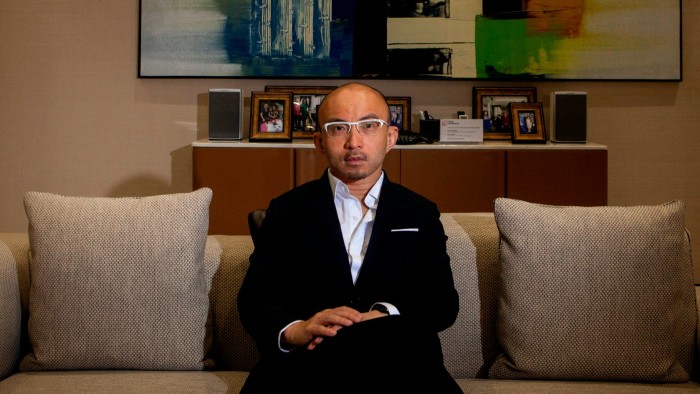The cloud over China’s entrepreneurs raises capital flight risk

Roula Khalaf, Editor of the FT, selects her favourite stories in this weekly newsletter.
Until recently Bao Fan was hardly a well-known name outside China, despite encapsulating the wealth that the country’s tech industry generated over the past 30 years. That was until news broke in mid-February that he had disappeared.
His company China Renaissance put out a notice saying it had been unable to contact Bao. Investors close to him have been reported as saying his problems were likely to be linked to the investigation of another executive at the firm.
For years, Bao had used his connections among the tech elite to bring the best consumer internet companies public, brokering alliances and divorces among them as they jockeyed for market share. China Renaissance listed in 2018, and Bao and his clients prospered; the deal maker was driven around Beijing in a purple Rolls-Royce.
His disappearance struck an unsettling note for investors and entrepreneurs in China. Following a high profile crackdown on some big tech companies and the imposition of pandemic lockdowns, there have been rising market hopes of a shift towards a more positive approach on growth and business after the National People’s Congress in October and the long-awaited withdrawal of the zero-Covid policies.
Those hopes helped fuel explosive market gains in Chinese stocks, with the MSCI China jumping almost 60 per cent from the end of October to highs in mid-January. It has since retreated about 15 per cent, mostly as a result of cooling of expectations on the rebound of the Chinese economy.
But one factor that has far from helped are the uncertainties over China’s attitude to entrepreneurs and business. If investors had hoped the tech crackdown was over, the Bao disappearance fuelled worries to the contrary. Indeed, these days it seems that positive signals on business are often countered by negative ones.
In January, Chinese authorities gave ride-hailing group Didi permission to sign up new customers after a long halt and its forced delisting from the New York Stock Exchange. But in the same month, Beijing moved to take a “golden share” in the local units of Tencent and Alibaba that formalise its greater control over the companies by giving the government special rights over certain business decisions.
Questions that were posed decades ago are being raised once more: How much wealth is too much wealth? At what point does an entrepreneur cross the invisible line into becoming an exploitative and monopolistic capitalist? Such uncertainty might be one reason venture capital funding for companies dropped sharply in the fourth quarter of last year to $7bn from $27bn in the same period in 2021, according to CBInsights.
In October, a Europe-based lawyer who works with wealthy Chinese families told the FT that the business elite was worried about rumours of a wealth tax and even their personal safety. A December note from Goldman Sachs’ consumer and wealth management arm pointed out some of the entrepreneurs that have stepped back from at least part of their roles at companies in recent years. In ecommerce, they include Jack Ma of Alibaba, Colin Huang of Pinduoduo and Richard Liu of JD.com. Other notable names listed were Zhang Yiming of TikTok parent company ByteDance and in the property sector, Pan Shiyi and Zhang Xin of Soho China and Wu Yanjun of Longfor Group.
Their motivations might have been varied but concerns over the business climate and indirect or direct pressure to maintain a low profile are undoubtedly a factor. In a speech last July, former Australian prime minister and China expert Kevin Rudd said a number of China’s most successful entrepreneurs were voting with their feet.
One Hong Kong-based mainland tycoon told me that in 2018, he worried that President Xi Jinping’s decision to cancel the two-term limit on the office meant the end of more than 40 years of consensual leadership and more anti-market rhetoric in Beijing. And so he began selling out of the Shanghai property holdings he had amassed over the previous 25 years.
The concern now among some investors is whether other individuals follow suit in moving money out of the country after the lifting of lockdown travel restrictions. Already there has been a boom in family offices setting up in Singapore. Ma was living in Tokyo last year for a period and the FT has reported that Bao was considering establishing a family office in Singapore in preparation to move some of his wealth there.
“If they reopen the borders, then capital flight becomes a risk,” adds one economist in Hong Kong at a multinational bank. “In the past, we saw money move first. Now people are trying to move. First the billionaires. Now the millionaires.”
Comments